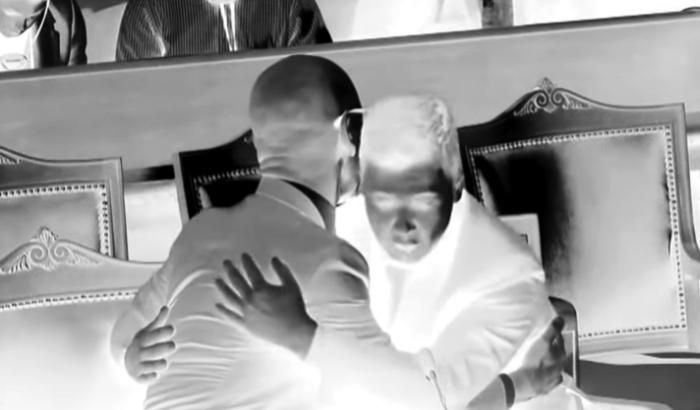One of the classic ways to stoke white fear and justify violence toward Arbery was to dehumanize his Blackness, but it didn’t stop there
When a predominately white jury found the McMichaels and Bryan guilty of felony murder among other charges in the Ahmaud Arbery case, many assumed justice was served compared to the Rittenhouse verdict. The juxtaposition of images of the two trial cases conjured hope for change in our two justice systems: Rittenhouse went home, while the McMichaels and Bryan went back to jail.
The belief that the justice scales were blind and balanced in the Arbery case is confusing accountability with justice. In truth, both trials were merely opposite sides of the same coin, displaying the fragility of whiteness.
White fragility is shown in the discomfort and defensiveness when whites are asked to address front and center racial injustice—whether in the Deep South or the urban North. Not wanting to ignite white fear nor white grievance, Linda Dunikoski, the prosecutor in the McMichaels and Bryan trial, did not mention race except once in her closing argument: “The men,” Dunikoski said, attacked Mr. Arbery “because he was a Black man running down the street.”
However, her one-sentence descriptor tapped a recurring theme: white men—like McMichaels and Bryan—chasing Black men to lynch in the Deep South. “He was trapped like a rat,” Gregory McMichael, 65, boasted to police after the shooting. William Bryant, 51, a neighbor of the McMichaels, said during his interrogation by the Georgia Bureau of Investigation that Travis McMichael, 35, said, “f—ing n-word” after fatally pumping three bullets into Arbery. As many Blacks know, hearing all this solid evidence does not assure a verdict.
The defense attorneys’ strategies, on the other hand, intentionally used dog whistles, racial tropes, and Georgia’s 1863 Civil War-era citizen’s arrest law to tap into white fear. During the antebellum period, the slave-catching law was for the sole purpose of returning fugitive slaves to their slave masters. The McMichaels attorney used that law to justify shooting Arbery, whose run took him into the white segregated section of town, as an imminent threat to white space and a dangerous bulgar. Greg McMichael told police he warned Arbery to stop running or would “blow your f***ing head off.”
One of the classic ways to stoke white fear and justify violence toward Arbery was to dehumanize his Blackness. Crude depictions of African Americans as ape-like, intellectually inferior, and hygienically unclean are enduring racial tropes that don’t die. Arbery was depicted running “in khaki shorts, with no socks to cover his long, dirty toenails” by one of the defense attorneys. Another defense attorney attacked Black pastors, saying, “We don’t want any more Black pastors coming in here … sitting with the victim’s family, trying to influence the jurors in this case.” As many Blacks know, hearing all these racist statements as defending evidence does not assure a verdict.
Dunikoski has been applauded for fighting racism, quietly. Many whites prefer racism to be spoken about softly, if at all, because it leads to the corrosive antics of silence and stalling change. Dunikoski’s strategy proved her knowledge of white fragility, and the defense attorneys’ displayed it.
The Rittenhouse trial, meanwhile, showed another aspect of white fragility: the damage of defensiveness.
Rittenhouse cried self-defense when he shot three white men, two of whom died during a protest in Kenosha over the police shooting of Jacob Blake. Blake, a Black man, was shot seven times in the back, leaving him paralyzed. (The police officer who shot Blake was acquitted too, but that’s a different trial.) Rittenhouse crossed state lines with an AR-style rifle and was acquitted of first-degree intentional homicide and four other felony charges.
Maintaining white fragility as a defense permits whites to universalize their human experience at the expense of people of color. It makes it difficult for whites to see BIPOC families reflected in theirs. The white judge and predominately white jury saw their son in Rittenhouse as a vigilante 17-year old whose boyhood shouldn’t be ruined. In contrast, I wished the white judge and predominately white jury in the Trayvon Martin case saw their sons in him. Trayvon was 17 wearing a hoodie, holding Skittles, unarmed, and shot by the neighborhood vigilante.
Also, white fragility allows whites to make invisible the suffering of others. Rittenhouse sobbed during his courtroom testimony, spurring the judge to pause the trial momentarily. The word “victim” was not used to depict the men Rittenhouse shot, but instead terms like “arsonists” and “looters.”
White fragility impedes justice and bolsters white supremacy’s bully stance against racism and its thin-skinned defensiveness to maintain it. These two court cases displayed that modus operandi.
Rev. Irene Monroe can be heard on the podcast and standing Boston Public Radio segment ALL REV’D UP on WGBH (89.7 FM). Monroe’s syndicated religion columns appear and the Boston voice for Detour’s African American Heritage Trail. She is a s a Visiting Researcher in the Religion and Conflict Transformation Program at Boston University School of Theology.


